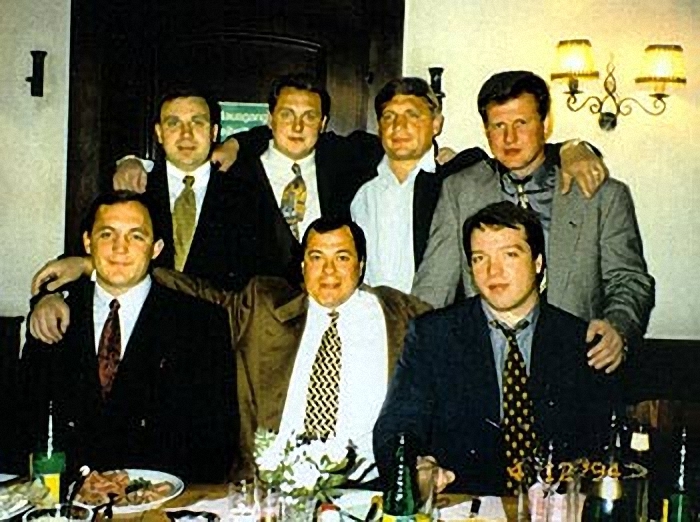The Solntsevskaya Brotherhood by Niko
It’s impossible to talk about the history of modern Russia without mentioning that lawless period of free-for-all mayhem that was the 1990s. When you look at Moscow today you see a modern metropolis. OK maybe Russia isn’t the freest country in the world, but people in the major cities live just as well as they do anywhere else in Europe. But it wasn’t always this way. Back in the day during the chaotic switchover from communism, the country took a sensational nosedive into a big, stinking pile of shit. Chechens were rebelling in the south; a couple of generals went rogue and tried to restart the Cold War, with tanks rolling through the streets of Moscow for the first time since WWII; and ordinary people didn’t know when their wages were gonna come or even if they were going to be paid at all. Russia, the country which sent the first man into space, now had old ladies lining up round the block to get a loaf of bread. A crime wave terrorized the nation, and the law of the gun reigned supreme as criminal gangs ruled with their own sense of order and impunity. And chief amongst these was the Solntsevskaya Bratva – the Solntsevo Brotherhood.
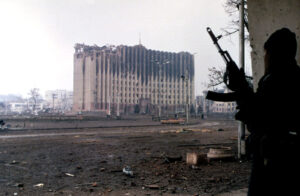 Sergei Anatolyevich Mikhailov was born in the Solntsevo neighbourhood of Moscow and started out working as a waiter at the Sovietskaya Hotel. It was a cushy job and one of the few spots you could get served alcohol after hours, and so was a place frequented by mobsters and other shady figures including Alimzhan Tokhtakhounov, a businessman from Uzbekistan currently wanted by Interpol for trying to fix the 2002 Winter Olympics, as well as a crafty Jewish conman by the name of Semion Mogilevich. This is where Mikhailov, aka “Mikhas”, got his first taste of that thug life. He also met two brothers and small-time crooks, ex-boxers Viktor and Alexander Averin. Mikhailov came over fully to the Dark Side in 1984 when he was thrown in jail for an insurance scam (he sold his motorbike then claimed it stolen). After six months in the pen he came out and started to roll with his old hoodlum buddies including the Averin brothers. Before long he was the leader of their little crew, the Solntsevskaya (named after the hood they grew up in), which offered protection to underground card games and beat up any troublesome policemen who happened to get in the way.
Sergei Anatolyevich Mikhailov was born in the Solntsevo neighbourhood of Moscow and started out working as a waiter at the Sovietskaya Hotel. It was a cushy job and one of the few spots you could get served alcohol after hours, and so was a place frequented by mobsters and other shady figures including Alimzhan Tokhtakhounov, a businessman from Uzbekistan currently wanted by Interpol for trying to fix the 2002 Winter Olympics, as well as a crafty Jewish conman by the name of Semion Mogilevich. This is where Mikhailov, aka “Mikhas”, got his first taste of that thug life. He also met two brothers and small-time crooks, ex-boxers Viktor and Alexander Averin. Mikhailov came over fully to the Dark Side in 1984 when he was thrown in jail for an insurance scam (he sold his motorbike then claimed it stolen). After six months in the pen he came out and started to roll with his old hoodlum buddies including the Averin brothers. Before long he was the leader of their little crew, the Solntsevskaya (named after the hood they grew up in), which offered protection to underground card games and beat up any troublesome policemen who happened to get in the way.
It was a time of great change. In 1988 Soviet leader Mikhail Gorbachev passed the Law on Co-operatives, paving the way for the first private businesses to open in areas like the Rizhsky Market. Racketeers were not slow to catch up. Whereas before – when any kind of entrepreneurship had to be kept on the down-low – they could only prey on the black market, now all their victims were out in the open. The Moscow police logged over 600 complaints of extortion that year but were stretched out too thin, too underfunded and had no idea what to do to be of any help. Everyone seemed to be doing something that could get you a nice long spell in Siberia not that long ago. The courts didn’t know what a contract was or how to enforce it. No-one knew what the fuck was going on. Meanwhile crime shot up as honest shopkeepers found themselves at the mercy of robbers, thieves and hooligans.
Since the law couldn’t protect you, you had to look outside it. You had to get yourself a “roof”, or a krysha. Krysha is Russian slang for ‘protection’, as in you hand over X amount of money each month to a corrupt politician, your old school buddy who joined the police force, a private security firm or the racketeering organization of your choice in order to avoid having problems. If you failed to keep up your end of the bargain you’d find yourself at risk of having an accident, maybe tripping up over a hand grenade or bumping into a loaded Kalashnikov. In Russia, it doesn’t pay being clumsy.
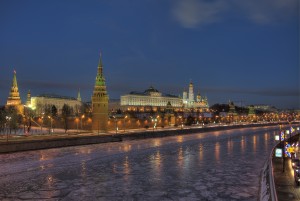 One such business was run by Vadim Rosenbaum, whose main enterprise was shipping computers over from France. He also had a side line dealing cocaine, smuggling it inside the computers. Rosenbaum originally came to Mikhas willingly to ask for protection against rival gangs. But the sharks could smell blood and as time went on he found himself trapped by his new partners. Mikhailov’s lieutenants were squeezing him more and more, demanding additional tributes or the keys to a new Volvo. As their behavior got even more brazen and arrogant Rosenbaum had enough and got in touch with the other victims. Together they went to the police, and in 1989 Mikhailov and Averin were arrested for extortion. But their case never made it to trial because Rosenbaum and the other witnesses suddenly changed their story, and in 1991 the two godfathers were freed. Rosenbaum was “forgiven” for his transgressions but the monthly protection fee had to go up. The Solntsevo were bleeding him dry and Rosenbaum was forced to flee the country to try his luck elsewhere.
One such business was run by Vadim Rosenbaum, whose main enterprise was shipping computers over from France. He also had a side line dealing cocaine, smuggling it inside the computers. Rosenbaum originally came to Mikhas willingly to ask for protection against rival gangs. But the sharks could smell blood and as time went on he found himself trapped by his new partners. Mikhailov’s lieutenants were squeezing him more and more, demanding additional tributes or the keys to a new Volvo. As their behavior got even more brazen and arrogant Rosenbaum had enough and got in touch with the other victims. Together they went to the police, and in 1989 Mikhailov and Averin were arrested for extortion. But their case never made it to trial because Rosenbaum and the other witnesses suddenly changed their story, and in 1991 the two godfathers were freed. Rosenbaum was “forgiven” for his transgressions but the monthly protection fee had to go up. The Solntsevo were bleeding him dry and Rosenbaum was forced to flee the country to try his luck elsewhere.
They got released just as things were getting interesting. Privatisation was the order of the day as the government began selling off its assets: factories, oilfields, their people’s dignity, everything. If you managed to get in on it, it was a sick deal as prices were mere breadcrumbs compared to what they were actually worth. But it was a very corrupt process, and those with friends in high places could jump right to the front of the queue. This meant a chosen few got super-rich super-fast, and that’s the reason why Moscow is now home to more billionaires than any other city on the planet. Naturally Mikhas and Averin wanted their slice of the pie, and they were very, very hungry.
Solntsevo was fast becoming a household name and its founders, street legends. Their home base, the neighbourhood of Solntsevo, made an ideal strategic location. Not only was it full of bored, unemployed, aggressive, tracksuit-wearing young men (tracksuits and leather jackets were definitely the pinnacle of 90s gangster fashion) eager to vent their frustration at some terrified merchants, but it was also within easy reach of both the Domodevo and Sheremetyevo airports, and the M-KAT highway connecting Russia with Ukraine and so, the rest of the world. Now the Solntsevo boys had direct control of over what went in and out of the country. This gave them the opportunity to engage in some legit business, importing luxury cars to a land where everyone was still driving crappy Ladas.
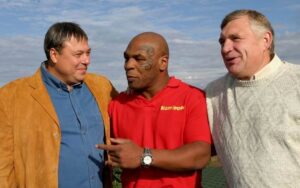 By 1993 the Solntsevskaya Bratva were the biggest crime syndicate in the city, controlling everything from cars to drugs to shopping centres and restaurants. They were organized like a Mafia family. At the top were Mikhas and the Averin brothers, and answering to them were the field commanders; captains leading brigades of hundreds of foot soldiers. To gain some standing with the vory-v-zakone (thieves-in-law; the old-school criminal elite which still held a lot of influence over the underworld) and add to their credibility they recruited Dzhemal Khachidze and put him to work taxing local drug dealers. Mikhas himself rejected the thief-in-law label, preferring to see himself as more of a businessman than some tattooed ex-con following an old tradition no-one cares about anymore. He had his eyes set on banking: fuck laundering your money through a bank – just own the bank!!!
By 1993 the Solntsevskaya Bratva were the biggest crime syndicate in the city, controlling everything from cars to drugs to shopping centres and restaurants. They were organized like a Mafia family. At the top were Mikhas and the Averin brothers, and answering to them were the field commanders; captains leading brigades of hundreds of foot soldiers. To gain some standing with the vory-v-zakone (thieves-in-law; the old-school criminal elite which still held a lot of influence over the underworld) and add to their credibility they recruited Dzhemal Khachidze and put him to work taxing local drug dealers. Mikhas himself rejected the thief-in-law label, preferring to see himself as more of a businessman than some tattooed ex-con following an old tradition no-one cares about anymore. He had his eyes set on banking: fuck laundering your money through a bank – just own the bank!!!
Another ‘businessman’ who emerged in this era was Boris Berezovsky, a man whose name comes up a lot in recent Russian history. He’d later become the man behind the throne of President Yeltsin and basically had the whole country in his pocket before Putin kicked him out. But before that Berezovsky owned a car dealership called LogoVAZ, taking advantage of the ridiculous rates of inflation to only pay back his suppliers when the value of money was so low the banknotes were barely good enough to wipe your ass with. A few goons from Solntsevo approached him. It’s a dangerous world out there, they said, an entrepreneur like you could use some protection. But there was a problem: he already had a krysha with the Chechens. The Chechen mafia in Moscow was known as Obschina (“the Community”) and was led by Nikolai Suliemanov and his right-hand man, Khozh-Ahmed Nuhayev. But Nuhayev was more than just a gangster; he was also a patriot and great supporter of the Chechen cause. Chechens had been itching for independence ever since they’d been conquered by the Russians hundreds of years ago, and Nuhayev was close to separatist leader Dzhokhar Dudayev. Thus one of the conditions he imposed on businesses under his ‘protection’ was to employ a Chechen in their workforce. That way he could get more of his countrymen down from the mountains who would, should the worst come to the worst, form an army.
The Chechens were also known for their hardline, shoot-first-ask-questions-later style of negotiating. Artem Tarasov, Russia’s first millionaire, described his experience of dealing with them:
“I took in members of the Chechen diaspora as my partners because the bandits were terrified of dealing with them. The Chechens behaved inappropriately from the thieves-in-law’s point of view. The thieves and other Russian criminal elements, they organized meetings and negotiations where they decided who was right, who was wrong and who promised what to who. The Chechens arrived at these meetings and just started shooting.”
And so the sit-down between the Solntsevo and the Chechens at the Kazakhstan Cinema resulted in ten deaths – six Chechens and four Russians. This meant war. The Solntsevskaya teamed up with the Orekhovskaya group led by Sergei Timofeyev aka “Sylvester” (for his resemblance to Sly Stallone) as well as Vyacheslav Ivankov aka Yaponchik (“the Jap”), a thief-in-law with a legendary status, striking terror into the hearts of cops, crooks and civilians alike.
Other turf wars were breaking out across the capital. Georgian crime boss Otari Kvantrishvili, who ran a sports club as a front for his racketeering activities, was assassinated by members of the Orekhovskaya as he left a sauna. Kvantrishvili was the public face of the mafia, rubbing shoulders with celebrities like Iosif Kobzon, a man known as Russia’s Frank Sinatra not only because of his singing style but also his ties to underworld big shots. A hitman, Alexander “the Terminator” Solonik, also nicknamed “the Macedonian” for his ability to shoot “Macedonian-style” (Russian slang for having a pistol in each hand), was responsible for a number of gangland killings, taking out a kingpin by the name of “Globus” while he was on a crowded dancefloor surrounded by bodyguards. After being captured by police Solonik escaped from the maximum-security Matrossovskaya prison, only to be murdered in Greece a few years later. A remote-controlled bomb exploded at a funeral killing thirteen people after two rival groups of ex-soldiers failed to resolve their differences, and Berezovsky narrowly survived a car bomb which blew his bodyguard’s head off. Russia’s murder rate reached Third World levels, comparable to places like Haiti and Jamaica.
But the Solntsevo came out on top thanks in no small part to their pals in the KGB. Russia’s infamous spy agency (now called the FSB but operating more-or-less the same way) was growing concerned about the Obschina’s links to Chechen militants fighting a guerrilla campaign. Forget a turf war; a real war was brewing in the deep dirty south. Nuhayev and Dudayev were tight, so tight that Dudayev even helped organize his jailbreak in 1991. So together with the FSB the Brotherhood worked to take down the Chechens, taking care of the bodies when the feds couldn’t get their hands dirty. It was the beginning of a beautiful friendship.
With the Chechens out of the way, the Solntsevo could get back to making money. They used charities as a front to wash their dirty laundry, putting money into orphanages so police raids on the premises could be scared off by the PR Armageddon that would erupt if it looked like they were snatching bread out the mouths of starving children. They learned this trick from Valery Vlasov, a casino owner whom Mikhailov later had killed when he no longer felt like sharing their profits. It also helped them look more legit, as did the time they built a church for a nearby village, the bells of which are inscribed with “from the Senior Priesthood, the Uchastiye Foundation, the CB-Holding Firm and the Solntsevo Brotherhood”.
Mikhailov fancied a change of scenery and so moved to Switzerland, the land of the cuckoo clock. But the Swiss are well known for their love of peace and tranquillity (after all, when was the last time you heard about the mean streets of Zurich?) and weren’t about to let a Russian mobster come along and spoil it all, so it wasn’t long before Mikhas was arrested in 1996 for money laundering, organized crime and breaking an obscure property law. The prosecution’s case looked good: they had testimonies from the Russian police, FBI and several credible eyewitnesses including a certain Vadim Rosenbaum, who’d come out of hiding to take revenge on the man who screwed him over. But even in the civilized West this wasn’t enough. Witnesses kept turning up dead. They found Rosenbaum’s body in Holland with a bullet in his head. He never even made it to the trial. Instead an officer of the FSB showed up to make a character statement, describing Mikhas as a respectable businessman and a pillar of the community. The trial collapsed in 1998 and Mikhailov even managed to squeeze half a million dollars in compensation for his wrongful arrest and all the suffering and distress it must have caused his fragile little mind.
Back in Russia, the Solntsevo tightened their grip on power, getting their representative Andrei Skoch into office. Skoch was elected into the Duma, or Russian parliament, and is now considered one of the country’s richest politicians through his control of telecommunications giant MegaFon. They’d spread their tentacles abroad as well. When the Soviet Union collapsed in 1991 most Jews realised that living in Russia is shit and got the fuck out, a lot of them to the Promised Land. By 1999, one-eighth of Israel’s population were immigrants from Russia, Georgia, Ukraine, etc. Israel was the perfect getaway for mobsters as well as it was on the sunny Mediterranean, far from the cold and bullet-strewn streets of Moscow and St Petersburg, and there were no laws against money laundering. It was easy to get an Israeli passport as well: just find a nice Jewish girl! Through their man Gregory Lerner, the Solntsevskaya group tried to rig local elections. But alas, Israel was not Russia and law enforcement was wise to their act, arresting Lerner and preventing a mafia takeover.
Another favourite destination was America. A wave of Jewish immigrants was already in New York City from the 70s under an agreement that allowed Jews to move abroad. The neighbourhood of Brighton Beach in south Brooklyn got so packed with new arrivals the area became known as Little Odessa. Among them were a few tough guys who chose the Tony Montana route to the American Dream. Their petty extortion rackets eventually gave way to a massive gasoline scam selling untaxed fuel through a network of gas stations together with the Lucchese and Colombo crime families, a multibillion-dollar enterprise that became the second biggest money-maker for the New York Mafia after drug trafficking. The Solntsevo wanted in, so in 1992 they sent their best (but not necessarily brightest), “Yaponchik” Ivankov, together with a contingent of heavies to move in on Little Odessa’s Jewish mob. The good times didn’t last though as in 1995 the feds picked him up for extortion and racketeering. Being the first time the FBI got their hands on a vor-v-zakone they made a big show of parading him in front of the news cameras but Ivankov, defiant to the last, kicked and spat at reporters as he was led away. He got 10 years in the bing.\
One of the Solntsevo Brotherhood’s most important associates was that sneaky Ukrainian Jew, Semion Mogilevich. Mogilevich wasn’t so much a mobster as he was a grade-A hustler. Born in Kiev, Mogilevich earned an economics degree from the University of Lviv in the west of Ukraine before moving to Moscow and using his smarts to run various scams, such as swindling his fellow Jews out of their property as they made the run for Israel. This made him his first couple mil, a cool sum by anyone’s standard but especially so in the Soviet Union, where we were all supposed to be equal and capitalism was the product of the decadent West. He became involved with the Solntsevskaya group in the late 80s and by the 90s he was their point man in Central Europe, cleaning their dirty money and running a prostitution ring out of his string of Black & White clubs. When he found out that Hungarian crime lord Tamas Boros aka “Big Tom” was snitching him out to the police, a car bomb exploded in downtown Budapest taking him out along with his lawyer and two innocent bystanders.
In 1995 the Solntsevskaya Bratva organized a birthday bash for Viktor Averin in Prague, complete with strippers, hookers and a cabaret show. The guest list was like a Who’s Who of the Russian mafia. But when Czech SWAT team commandos burst through the doors of the restaurant they found that the life and soul of the party, Semion Mogilevich, was nowhere to be seen. Turns out the fat man owed five million dollars to the group’s mutual fund for hiring lawyers, investing in new business ventures, etc. and he’d refused to pay. Figuring he’d probably find himself on the menu in place of the birthday cake, or maybe because he’d been tipped-off about the upcoming raid, Mogilevich elected to sit the night out in a hotel bar. Either way, Uncle Seva managed to stay one step ahead of both the cops and the Mob.
Mogilevich was a criminal mastermind of Bond villain heights. Considering all he’s supposed to have done, it’s kinda lame that he’s only on the FBI Top Ten Most Wanted list for ripping off American investors through a front company using an elaborate scheme involving shell companies and offshore accounts. Whether or not he’s still part of the Brotherhood is up for debate (especially after the Prague incident), but right now he’s living the easy life in Moscow, knowing full well any extradition request from the Americans will only get them told to go fuck themselves.
But back to the Solntsevo. With the lifting of the Iron Curtain and the opening of the borders, shoving the devil’s dandruff up your nose was becoming an increasingly popular hobby with those Russians who could afford it. So the Solntsevo flew their people over to the island of Aruba to sit down with members of the Cuntrera-Caruana Mafia clan, Sicilians with a direct line to the Colombian Cali cartel. Then there was another very profitable business the Solntsevskaya took an interest in. Russia is the single biggest smack market in the world. After it was introduced to the country via Afghan war veterans in the 80s it swept across the nation after the collapse of communism, riding the wave of all the hopelessness and poverty it brought with it as well as creating Europe’s worst HIV epidemic as junkies shared needles. The Brotherhood’s heroin connect is the Uzbek drug lord Gafur Rakhimov. Like the Averins, Rakhimov started out as a boxer, moving into ‘private enterprise’ when the Soviet’s long and proud sports programme died along with their ideals. Uzbekistan lies right on the Northern route between Russia and the producers in Afghanistan, and Rakhimov uses his political clout (he sits on the International Olympic Committee) to move his shipments through the country undetected.
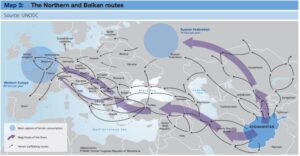 Nowadays, Mikhas has stepped back from a life of crime. He prefers hanging out with his new best friend Mike Tyson and telling everyone he’s a philanthropist. But Solntsevo is still around. According to WikiLeaks, it operates under the protection of the FSB. With operations worldwide and the backing of the Russian state, the Solntsevo Brotherhood is one of the most powerful criminal groups on the planet, right next to Mexico’s Sinaloa cartel. And they’re not done yet.
Nowadays, Mikhas has stepped back from a life of crime. He prefers hanging out with his new best friend Mike Tyson and telling everyone he’s a philanthropist. But Solntsevo is still around. According to WikiLeaks, it operates under the protection of the FSB. With operations worldwide and the backing of the Russian state, the Solntsevo Brotherhood is one of the most powerful criminal groups on the planet, right next to Mexico’s Sinaloa cartel. And they’re not done yet.
If you like this article check out Gangs in the United Kingdom by Niko



